David C. Broderick facts for kids
Quick facts for kids
David Broderick
|
|
|---|---|
 |
|
| United States Senator from California |
|
| In office March 4, 1857 – September 16, 1859 |
|
| Preceded by | John B. Weller |
| Succeeded by | Henry P. Haun |
| Lieutenant Governor of California | |
|
Acting
|
|
| In office January 9, 1851 – January 8, 1852 |
|
| Governor | John McDougall |
| Preceded by | John McDougall |
| Succeeded by | Samuel Purdy |
| Member of the California Senate | |
| In office 1850–1852 |
|
| Personal details | |
| Born |
David Colbreth Broderick
February 4, 1820 Washington, D.C., U.S. |
| Died | September 16, 1859 (aged 39) San Francisco, California, U.S. |
| Political party | Democratic |
| Other political affiliations |
Free Soil |
David Colbreth Broderick (born February 4, 1820 – died September 16, 1859) was an American lawyer and politician. He became a U.S. Senator for California. He was chosen by the state legislature. Broderick was born in Washington, D.C. His parents were immigrants from Ireland. He lived in New York before moving to California during the Gold Rush.
Contents
Early Life and Moving West
David Broderick was born in 1820 in Washington, D.C.. His father was a stonecutter who came to the U.S. to work on the United States Capitol building. In 1823, David and his family moved to New York City. There, he went to public schools. He also learned the trade of a stonecutter.
In 1849, Broderick decided to join the California Gold Rush. He moved to San Francisco. There, he worked with gold, melting it down and testing its purity. He used the money he earned to help fund his political goals.
Starting in Politics
Broderick became involved in politics when he was young. He joined the Democratic Party. In 1846, he ran for a seat in the U.S. House of Representatives for New York. He did not win that election.
California State Politics
From 1850 to 1852, Broderick was a member of the California State Senate. He even served as its president from 1851 to 1852. For a year, he was also the acting Lieutenant Governor. This happened after the previous Lieutenant Governor, John McDougall, became the governor.
Broderick became very powerful in San Francisco politics. He used his experience from New York to build a strong political organization. This organization helped him and his allies win many elections. He would help people get nominated for important and well-paying jobs. In return, they would support his political efforts. This system helped Broderick become very wealthy and influential.
In 1856, Broderick was elected as a U.S. Senator for California. Back then, state legislatures chose senators, not the people directly. He started his term on March 4, 1857.
A Political Rivalry and Its Tragic End

Before the American Civil War began, the Democratic Party in California was divided. One group supported slavery, and another, called the "Free Soilers," was against extending slavery into new territories. Broderick was a leader of the Free Soilers.
One of his former friends was David S. Terry. Terry had been the Chief Justice of the California State Supreme Court. He strongly supported extending slavery. Terry lost his re-election, and he blamed Broderick for it.
Terry made some angry comments about Broderick at a political meeting. Broderick read about these comments and responded with his own strong words. He criticized Terry and other politicians. The disagreement grew very intense.
On September 13, 1859, Broderick and Terry, both skilled marksmen, met for a duel. Duels were illegal but sometimes happened to settle serious disputes. During the duel, Broderick's pistol fired too early. This left him unarmed. Terry then shot Broderick in the lung. Broderick died three days later. He was buried in San Francisco.
Broderick's Legacy
Edward Dickinson Baker, a friend of Abraham Lincoln, spoke at Broderick's funeral. Many people believed that Broderick was killed because of his strong stance against slavery. Baker said that Broderick died because he was against a "corrupt administration and the extension of slavery."
Some people saw Broderick's death as a sacrifice for the anti-slavery cause. This event was part of the growing tensions that led to the Civil War. At the Republican National Convention in 1860, a picture of Senator Broderick was displayed.
About 30 years later, David Terry was shot and killed by a U.S. Marshal. This happened when Terry threatened Supreme Court Justice Stephen Johnson Field, who was a friend of Broderick.
Several places were named in Broderick's honor. These include Broderick County, Kansas Territory, the former town of Broderick, California, and Broderick Street in San Francisco.
In 1963, the television show Death Valley Days featured an episode about Broderick and Terry. Carroll O'Connor played Broderick in the episode.
 | Tommie Smith |
 | Simone Manuel |
 | Shani Davis |
 | Simone Biles |
 | Alice Coachman |

